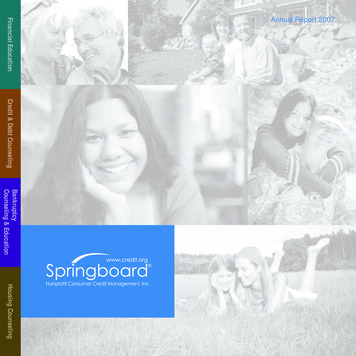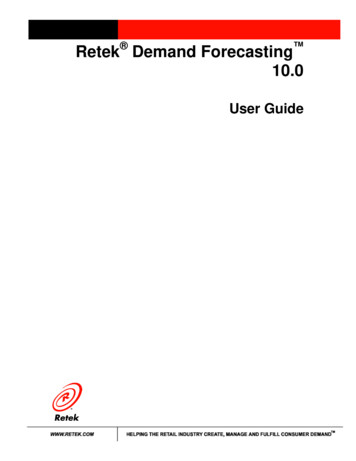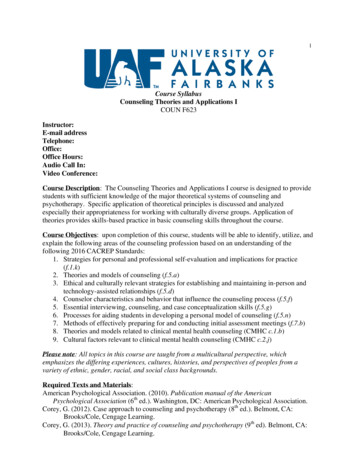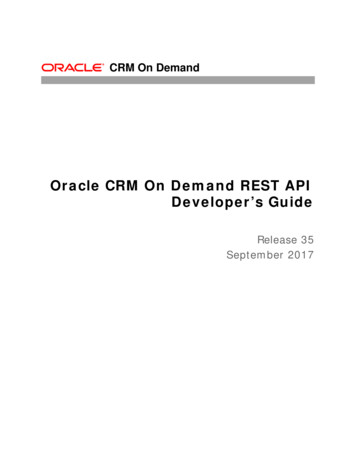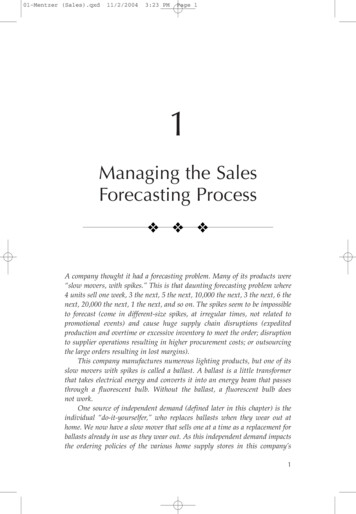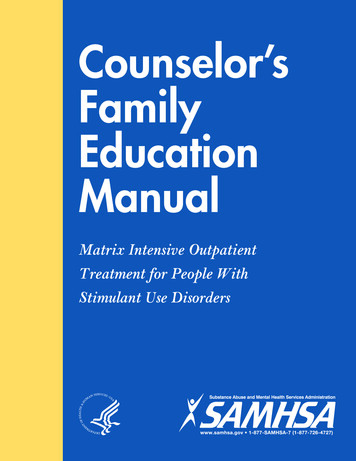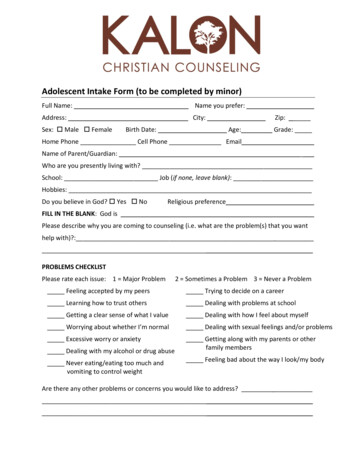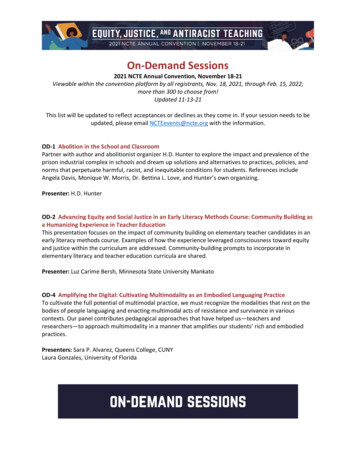
Transcription
On-Demand Sessions2021 NCTE Annual Convention, November 18-21Viewable within the convention platform by all registrants, Nov. 18, 2021, through Feb. 15, 2022;more than 300 to choose from!Updated 11-13-21This list will be updated to reflect acceptances or declines as they come in. If your session needs to beupdated, please email NCTEevents@ncte.org with the information.OD-1 Abolition in the School and ClassroomPartner with author and abolitionist organizer H.D. Hunter to explore the impact and prevalence of theprison industrial complex in schools and dream up solutions and alternatives to practices, policies, andnorms that perpetuate harmful, racist, and inequitable conditions for students. References includeAngela Davis, Monique W. Morris, Dr. Bettina L. Love, and Hunter’s own organizing.Presenter: H.D. HunterOD-2 Advancing Equity and Social Justice in an Early Literacy Methods Course: Community Building asa Humanizing Experience in Teacher EducationThis presentation focuses on the impact of community building on elementary teacher candidates in anearly literacy methods course. Examples of how the experience leveraged consciousness toward equityand justice within the curriculum are addressed. Community-building prompts to incorporate inelementary literacy and teacher education curricula are shared.Presenter: Luz Carime Bersh, Minnesota State University MankatoOD-4 Amplifying the Digital: Cultivating Multimodality as an Embodied Languaging PracticeTo cultivate the full potential of multimodal practice, we must recognize the modalities that rest on thebodies of people languaging and enacting multimodal acts of resistance and survivance in variouscontexts. Our panel contributes pedagogical approaches that have helped us—teachers andresearchers—to approach multimodality in a manner that amplifies our students’ rich and embodiedpractices.Presenters: Sara P. Alvarez, Queens College, CUNYLaura Gonzales, University of Florida
Eunjeong Lee, University of HoustonOD-5 And Now for Something (Almost) Completely Different: Rethinking the Literary Canon andLiterature Survey Courses for Preservice TeachersWe’ve talked for years about challenging the literary canon, criticizing it for being racist. Yet it stillmaintains control of how literature is taught and what is included in anthologies. This presentationpushes against how literature courses are organized, exploring changes the presenter made across threesemesters in her university literature survey course and discussing next steps.Presenter: Sheila Benson, University of Northern IowaOD-06 Antiracisim in Teacher Education: Centering Equity, Justice, and TransformationPresenters and attendees with engage with ways to think about how centering equity, justice, andtransformation can lead to antiracist practice and stance in teacher education.Presenters: Corey Humphrey, University of PittsburghTodd McCardle, Eastern Kentucky UniversityKathryn McClintock, University of Northern ColoradoCindy Morton-Rose, Meredith CollegeEmily Rainey, University of PittsburghSonja Yow, Eastern Kentucky UniversityEmily Zuccaro, Eastern Kentucky UniversityOD-07 Antiracism Is Not an Action ItemThe session will examine literacy instructors' attitudes attitudes towards 'nonstandard' Englishes weredeeply rooted in standard language ideology, the findings and implications of antiracism-focused facultyprofessional development for FYC instructors at a public Hispanic Serving Institution, and obstaclesfacing intersectional antiracist pedagogy to create more sustainable antiracist action.Presenters: Allison Craig, University at Albany, SUNYChrista de Kleine, Notre Dame of Maryland UniversityMara Lee Grayson, California State University, Dominguez HillsRachele Lawton, The Community College of Baltimore CountyOD-8 An Antiracist Book Study with Preservice Teachers: A Case StudyThis presentation provides attendees the details of a book study that was conducted using Stamped:Racism, Antiracism, and You with preservice teachers at an urban university in southeast Texas.Preservice teachers were able to discuss the antiracist ideas presented in the text and gain crucial skillsfor what culturally responsive teaching can look like in the K–12 classroom.
Presenters: Abbey Bachmann, University of HoustonSusan (Sunny) Stubbs, University of HoustonOD-9 Antiracist Editing: A Conversation with the Editors of KokilaThrough a conversation between professional editors of color facilitated by one of their award-winningyoung adult authors, this session will explore how writing feedback can subvert standard approaches tobecome truly antiracist.Presenters: Joanna Cadenas, Kokila/Penguin Random HouseZareen Jaffery, Kokila/Penguin Random HouseSydnee Monday, Kokila/Penguin Random HouseRandy Ribay, Kokila/Penguin Random HouseNamrata Tripathi, Kokila/Penguin Random HouseOD-10 Antiracist Literature that Empowers Students to Act toward Equity and JusticeFive diverse authors will problematize, inquire, and discuss with the audience how to tackle and takeactionable steps in building equal, just, and antiracist classrooms. Authors Entrada-Kelly, Fleming, Ho,Ireland, and Pink will share their work and facilitate an empowering process of discovery of self andothers.Presenters: Jackie Arnold, University of DaytonMary-Kate Sableski, University of DaytonTradebook Authors/Illustrators: Erin Entrada-Kelly, HarperCollinsCrystal Fleming, Henry HoltJoanna Ho, HarperCollins /East Palo Alto AcademyJustina Ireland, HarperCollinsRandi Pink, Macmillan Children’s Publishing GroupOD-11 Antiracist Pedagogies and Curriculum in Teaching/BeingBy enacting transformative and culturally relevant-sustaining practices, presenters illuminate thepossibilities for, through, and in antiracist literacy teaching and practice.Presenters: Malika Ali, Highlander InstituteBrooke Harris Garad, Indiana University-BloomingtonTaji Gibson, Indiana University-BloomingtonOD-12 Antiracist Pedagogies and Practices in Teacher Education
Informed by antiracist perspectives of teacher education, papers in this session examine curriculum,institutional policies, and Black PSTs lived experiences to elucidate the constant and insidious influenceof white supremacy culture and to offer suggestions for disrupting these tendencies.Presenters: Briana Asmus, Aquinas College, Grand Rapids, MIRachel Grant, CUNY College of Staten IslandHeather Hurst, Frostburg State UniversityStephanie Schmier, CUNY College of Staten IslandOD-13 Aperture Adjustment: Closure, Exposure, and Sexual Composure In Kelly Loy Gilbert’s PictureUs in the LightThis roundtable draws from the experiences of a novice ELA teacher and her college mentor to discussthe depictions of queerness and identity in Kelly Loy Gilbert’s Picture Us in the Light. Using this text astheir primary access point, the two teachers will share experiences, insights, and strategies to engagestudents in explorations of queerness in YAL that serve to promote equity and justice.Presenters: Emily Badger, Ball State UniversityJeff Spanke, Ball State UniversityOD-14 Artifact as Influence: Uncovering and Healing from Community Racial InjusticesAs white educators in a majority-white rural community, we are positioned to share our work ofuncovering our local histories of racial inequities in the classroom. Teaching in a former sundown town,we will show educators how to do this through a four-step process of acknowledgment; uncoveringproblematic or previously undiscussed artifacts of the community; shared dialogue; and healing.Presenters: Shayla Ewing, Pekin Community High SchoolJeanette Odle, Pekin Community High SchoolOD-15 “Ask. Just Ask Them”: Black Adolescent Males’ Advice for Teachers Wishing to Promote Justicein Literacy ContextsThis presentation focuses on the advice that Jonathon, a Black male student who has pushed his highschool teachers to expand their curriculum with contemporary African American literature, offers to toeducators who wish to promote justice in their own classroom contexts.Presenter: Katherine Sciurba, San Diego State UniversityOD-16 Asking the Hard Questions: Examining Our Classrooms through an Antibias LensThis panel will share successful strategies that led to a reflective examination of classrooms through anantibias lens. Teachers from three states analyzed their classroom practices and how those actions
affected student voices. Join us for a rich discussion of what was discovered through virtual discussionsand online platforms leading to some answers but even more questions for practitioners.Presenters: Rebecca Kaminski, Clemson UniversityMary Parker, University of MississippiTobi Pirolla, Clemson UniversityEllen Shelton, The University of MississippiOD-17 At the Intersection: Curating in the ClassroomBlackness and Black Americans are not a monolith; rather, we are a rich, various, and complex culturesituated within the US context. In this presentation, I explore ways teachers can utilize curation as ameaning-making framework to create spaces in our classrooms for learning and dialogue by juxtaposingart, literature, and intellectual thought.Presenter: Renee Wilmot, Michigan State UniversityOD-18 Authoring Family Storybooks: A Powerful Storytelling Tool Used by Burmese ChildrenThis study explores how three Burmese refugee children created their family storybooks and told theirstories that are often invisible in the dominant discourse. Based on preliminary data analysis, tentativefindings show that the children drew upon various modalities to create their family storybooks andrepresent their stories in relation to culture, literacy, and identity.Presenter: Aijuan Cun, University of New MexicoOD-19 Becoming and Being AntiracistGrounded in the experience of six veteran antibias/antiracist (ABAR) educators, we aim to support folxwithin the educational community by developing an ABAR lens and practice through sharing ourjourneys in this work. At the end of this session, participants will have antiracist language, a liberatoryframework, and examples for handling pushback from caregivers and administrators.Presenters: Maribel Gonzalez, Amplifier Art EducationBritt Hawthorne, Britt Hawthorne LLCTiffany Jewell, Multicultural ClassroomLiz Kleinrock, Heinemann/Teach and TransformTrisha Moquino, Keres Children’s Learning CenterTurquoise Parker, Durham Association of EducatorsOD-20 Beyond Booklists: Fostering Equity and Cultivating Access to the Full Spectrum of HumanBrilliance
Equitable education demands reimagining curriculum and instruction. Three author-educators sharestrategies for centering historically marginalized identities. From the language we use to the ways weoffer choice to our interrogation of biases, this session engages participants in fostering equity andcultivating access to the full spectrum of human brilliance.Presenters: Nawal Casiano, NQC Literacy LLCKate Roberts, K & M Literacy, LLCJasmine Warga, HarperCollins Children’s BooksOD-21 Beyond Buzzwords: A Framework for Positioning Antiracism, Equity, and Justice at the Centerof Your ClassroomAntiracism, equity, and justice are not trendy words but a call to action. Nevertheless, the need toelevate these values in our classroom can feel daunting. Presenters will offer a how-to framework thatprovides teachers with the guidance to reimagine the curriculum, engage students in meaningfulconversation, and use critical theory to empower them to analyze texts and build empathy.Presenters: Sarah ChanAlison Daniels, Howard County Public School SystemOD-22 Beyond Number the Stars: Toward a Literacy Framework for Fighting Anti-Semitism in theClassroomThis presentation explores ways to update the way anti-Semitism is discussed in upper elementary andmiddle school classrooms. Drawing upon tenets of critical race theory, we propose a framework for antiSemitic conciousness-raising as a lens to (re)consider the types of books and themes that havehistorically positioned Jewish voices in US mainstream curricula.Presenters: Lillian Ardell, Language Matters LLCBarbara GolubOD-23 Beyond the Book: Student-Produced Multimodal Responses to Critical and Culturally RelevantLiteratureIn literature study, we may invite students to create book trailer videos or a slideshow to share insightson a text. Unfortunately, these are effectively digital dioramas. Three literacy professors and a YA authordescribe a unit of study in which they pushed readers to move beyond the book, creating significantculturally relevant multimodal responses such as podcasts, timelines, and websites.Presenters: Kevin Cordi, Ohio University LancasterJacqueline Yahn, Ohio University EasternTradebook Author/Illustrator: Chrystal D. Giles, “Take Back the Block Response”
Respondent: Troy Hicks, Central Michigan University, “Responding to the Work”OD-24 Beyond the Booklist: Literacy as a Tool for AntiracismIn this session, we discuss antiracism for white teachers. We show how antiracism is literacy work.Beyond the antiracist booklist, we’ll explore new possibilities for antiracist teaching in literacyclassrooms. It centers antiracism to craft lines of inquiry that guide our reading, writing, and advocacy.We’ll transfer our own learning to develop antiracist literacy practices with students.Presenters: Jordan Corson, Stockton UniversityPaul Shirk, Brooklyn Compass Charter SchoolOD-25 Beyond the Remote Island: Realizing Hope and Humanizing Moments of Isolation, Rage, andUncertainty in Teaching and LearningGrade 7–12 educators will explore how remote teaching has exacerbated a range of inequities withinschool systems and communities. Interweaving personal testimony, primary sources, and humanizingdigital literacy practices, the workshop will encourage educators to consider the ways in which we canboth emotionally engage in and disrupt systems of student and teacher oppression in schools.Presenters: Jen Freed, Philadelphia Writing ProjectGeena Molinaro, Philadelphia Writing ProjectBeth Patten, Philadelphia Writing ProjectOD-26 Beyond White Privilege Pedagogy: Professional Development for EducatorsPresenters will discuss the design, implementation, and lessons learned from a monthly, year-longinstitute on whiteness and antiracism for white in-service educators. The institute, designed to addressthe short-comings of white privilege pedagogy, seeks to reframe classroom conversations away fromindividualized racism and toward a focus on structural racism and white supremacy.Presenters: Lee Fisher, University of MinnesotaKevin Lally, Cretin-Derham HallEllie Roscher, The Loft Literary CenterOD-28 Black Lives Matter in Rural Places, Too: Helping Rural Students of Color Find “Mirror” TextsRelatively few children's books featuring Black characters in rural settings are available to youngreaders. To increase rural Black students' ability to see themselves and other people of color reflected inliterature, this session is dedicated to sharing literature selections featuring characters of color in ruralspaces geared toward younger elementary, middle grade, and young adult readers.Presenter: Rachelle Kuehl, Virginia Tech
OD-29 Book Clubs for Antiracist EducatorsLearn how to leverage the power of technology and text with fellow educators on how to be antiracist.Create the space for reflective conversations, and personal and professional growth on topics thatdeeply affect students, families, schools, and classrooms. We will share HyperDocs for hosting bookclubs on Becoming, Biased, and White Fragility, and a digital notebook to lead a study on America to Me.Presenters: Kelly Hilton, Pleasanton Unified School DistrictJenna Hewitt King, Pleasanton Unified School DistrictNadia Razi, Pleasanton Unified School DistrictOD-30 Building Community through Student-Led Writing Events: Students Demonstrate Methods toCreate Successful Family Literacy Nights and Cross-Site GatheringsBread Loaf Teacher Network NextGen students from Aiken, SC, and Louisville, KY, share provenstrategies for creating and hosting community, family, and cross-site writing events that bring peopletogether from many different cultures, races, and backgrounds. Participants will receive writingprompts, materials needed to plan an event, and specific strategies to help make their event a success.Presenters: Kayla Hostetler, Aiken County Public SchoolsHeather Jones, Fern Creek High SchoolOD-31 Building Equity Literacy through Case Study AnalysisPedagogical practices with a focus on case studies to develop the language, the ways of thinking andplans of action to pursue justice and equity within our classrooms are shared within this session. Thispresentation models the use of case studies, allowing participants to be actively engaged and walk awaywith a practice they could use in their respective settings.Presenters: Allie Blosser, High Point UniversityOD-32 Building on Black@: Leading by ListeningBlack students have called on teachers and schools alike on Instagram through various “Black@”accounts to take real action on dismantling white supremacy at both the institutional and individuallevels. This workshop will offer participants an opportunity to reflect, converse, and collaborate withcompatriots on how best to respond to that call-to listen and then lead.Presenters: Nina Davidson, Concord-Carlisle High SchoolDenny Gonzalez, St. Albans School/Bread Loaf School of EnglishOD-33 Building Preservice and Early Career Teachers Capacity for Humanizing Writing Instruction
How might we prepare teachers so that they experience writing, learning to teach writing, andprofessional development as a humanizing endeavor centered on students’ lives, identities, stories, andcommunities? In this session, we offer research-based presentations about two “third space” efforts toreimagine preservice and early career induction sponsored by a National Writing Project site.Presenters: Jessica Early, Arizona State UniversityChristopher MazuraTom Meyer, SUNY New PaltzMary Sawyer, SUNY New PaltzOD-34 Building Worlds of Color: Reimagining Speculative FictionHow can we reimagine speculative worlds that empower and authentically portray characters of color?Join an educator in conversation with author Jordan Ifueko and artist, author, and AfroSpeculativescholar John Jennings as we discuss antiracist worldbuilding and provide critical analysis questions andwriting strategies for students in restorying speculative media.Presenter: Jewel Davis, Appalachian State UniversityTradebook Authors/Illustrators: Jordan Ifueko Raybearer, AbramsJohn Jennings, Megascope Comics, an imprint of AbramsOD-35 "But You're Too Young," Is Not AcceptableThere is an urgency to challenge bias, stereotypes, and prejudice in our youngest classrooms. Thesepresenters discuss how they worked within their own classrooms to dismantle injustices within theirearly childhood classrooms.Presenters: Alexandra Jenkins, Meadowfield Elementary, RCSD1Alisha Nguyen, Boston CollegeOD-36 Calling Students to Action through Literacy InstructionHow do we use our literacy teaching to help students learn to create positive change? Clint Smithsuggests encouraging students to “read critically, write consciously, speak clearly, and tell your truth.” Inthis session, educators share literacy practices that identify issues of inequity and move studentstowards action.Presenters: Gary Gray, International School of ManilaJessica Lifshitz, Northbrook School District 28Narin Ramani, International School of ManilaOD-37 Can You See Me Now? Reading and Centering Student Voices
Ranging from picture books to nonfiction and YA literature, educators work to not only include, but tocenter student's identities and voices in the classroom.Presenters: Christian Hines, The Ohio State UniversityDoricka Menefee, The Ohio State UniversityOD-38 Celebrating International Stories for Children and AdolescentsCome hear the Outstanding International Books Committee of USBBY (United Board on Books for Youth)present the 2020 list of exemplary books for grades preK–12, originally published around the world,then distributed in the US. Two authors will then share their writing process, particularly the joys andchallenges of writing a book connected to an international context.Moderator: Ebony Elizabeth Thomas, University of MichiganPresenters: Anamaria Anderson, National Museum of ArtPatricia Bloem, Grand Valley State UniversityEvelyn Freeman, The Ohio State UniversityJennifer Graff, University of GeorgiaNancy Johnson, Western Washington UniversityAmy McClure, Ohio Wesleyan UniversityMary Napoli, Penn State University-HarrisburgBettie Parsons-Barger, Winthrop UniversityTradebook Authors/Illustrators: Samira Ahmed, “Bridging Cultural Divides in YA Fiction”Sarwat Chadds, Disney, Author, City of the Plague GodsOD-39 Centering Future Teachers Stories, Desires, and Imaginations: An Antiracist Redesign of aSecondary Teaching Preparation ProgramThis multivoiced panel of teacher educators and students shares an antiracist redesign of a secondaryteaching preparation program envisioned to best serve the needs, desires, and imaginations of firstgeneration, college-going, BIPOC, and Pell-eligible students. We will share how student pláticasinformed this work. Participants will leave with approaches for reimagining their own programs.Presenters: Jen Johnson, Sonoma State UniversityTheresa Burruel Stone, Sonoma State UniversityRespondent: Fawn Canady, Sonoma State University, “Response to Antiracist Redesign from SingleSubject Perspective”OD-40 Centering the Needs, Identities, and Experiences of Refugee, Queer, and Underserved Youth inLiteracy Education
These four presentations center the identities and literacy practices of elementary, middle, and highschool students from non-dominant communities and offer humanizing, innovative, data-drivenstrategies to support youth agency and critical literacy development in K-12 classrooms.Presenters: Ted Fabiano, Berthoud High School/Kansas State University/Greater KC Writing ProjectWhitney McCoy, University of VirginiaKathrina O'Connell, Bemidji State UniversityAddie Shrodes, Northwestern UniversityNermin Vehabovic, University of Missouri at St. LouisOD-41 Centering Stories that Matter to Students: Protest Documentary ProjectsThis presentation discusses “Protest and Empowered Voices,” a unit centering poetry, music,movements, and current events related to protest in this country and around the world. It discusseshow documentaries prove an effective genre to protest and speak out on important issues and providesstudent-created models of “protest documentaries” that amplify their voices on issues of importance tothem.Presenters: Derren Harwell, University of GeorgiaLisa York, Gwinnett County Public SchoolsOD-42 Changing the Conversation on Assessment through Advocating for What Students KnowSponsored by the Standing Committee on Literacy AssessmentThis session will focus on advocating for students’ multiple ways of knowing through diverse assessmentpractices. Undergirding these roundtable discussions is the criticality of progressive assessmentpractices in K–16 classrooms.Presenter: Bobbie Kabuto, Queens College, CUNYRoundtable Leaders: Chris Hass, Center for Inquiry, “Student-Led Conferences: Supporting Students toReport on Their Own Growth”Bobbie Kabuto, Queens College, CUNY, “In-the-Moment Assessment Practices: Assessing in the Cracksof Scripted Curriculum”Kathryn Mitchell Pierce, Saint Louis University, “Revaluing Silent Students in Literature DiscussionGroups”Peggy O’Neill, Loyola University, “Using Assessment as a Bridge between High School and College”OD-43 Children’s Gender Literature Read Alouds in the Classroom as Tools for Interrogating Equityand JusticeThis study highlights the approaches of three teachers as they introduce literacy as a vehicle to promotesocial justice and gender equity to their elementary bilingual classroom students. Their approachesinclude read-alouds and discussion through problem-posing education that entails listening, dialogue,
and action. This work seeks to position issues of gender equity and justice as important as antiracistteaching.Presenter: Gilberto Lara, University of Texas at San AntonioOD-44 Children's Literature and Antiracist Teaching and Teacher EducationBefore we are ready to analyze children's literature with young learners, we must be willing to do so aspre-service and practicing teachers. In this session, participants will be invited to engage in readings ofand conversations around children's literature, focused on identifying racist and anti-racist policies andpractices embedded within, by prioritizing diverse perspectives and experiences.Presenters: Hajnal Eppley, BioMed Science AcademyJen McCreight, Hiram CollegeOD-45 Class Acts: Cultural Approaches for Analyzing Class through LiteratureAs a way to address ELA's usual class-blind approach to analyzing texts, this panel focuses on affectivetreatments of class: understanding that as much as class difference is effected structurally, thesedifferences are experienced emotionally. Presentations share affective strategies for analyzing class inhigh school and teacher education contexts.Presenters: Nicole Godard, Hampden Charter School of Science, “Beyond Haves and Have-Nots: ClassAnalysis in the High School Classroom”Sophia Sarigianides, Westfield State University, “Teachers’ Responses to Affective Class Analyses of YAL”Amanda Haertling Thein, University of Iowa, “Locating Class Affect and Emotion in Rural, WhiteStudents’ Responses to Racism in Multicultural Literature”OD-46 Close Reading to Disrupt White SupremacyPresenters will discuss teaching A Raisin in the Sun as an exemplary antiracist text.Presenters: Alice Dominguez, Mater Dei Catholic High SchoolMiguel Ramon, University of CaliforniaOD-47 Co-Conspiring LGBTQ Intersectional Spaces with GSA²: Community Activism in an OklahomaGay-Straight AllianceCreating collaborative pathways that brings together a variety of stakeholders is key to developinginclusive classrooms and schools. Discover how literature helped this community start and continueconversations around equality, equity, and advocacy. Learn how to create a GSA Club in your schoolsand then cultivate intersectional safe and public spaces of activism.Presenters: Alison Black, Stillwater Public Schools
Sarah Donovan, Oklahoma State UniversityUwe Gordon, Stillwater High SchoolDillon Graham, Stillwater Junior High SchoolKristy Self, Stillwater High SchoolOD-48 Code Meshing: Mixing All Languages and Dialects in Our ClassroomsParticipants learn about code meshing and receive strategies and YA lit book lists to use immediately intheir classrooms. The activities will encourage students to play with, mix, and analyze their languagesand dialects, deconstructing “standard American English” and de-privileging the language hierarchy, sothat learning is equalized for all.Presenter: Lauren Amores, Colegio Nueva GranadaOD-49 Combatting Structural Racism through Book Selection in a Reading PracticumA literacy teacher educator uses Gholdy Muhammad's historically responsive literacy framework (2020)to examine inservice teachers' book selection in a reading practicum to highlight and disrupt structuralracism and inequality in the curriculum, and to promote a more humanizing pedagogy.Presenter: Nadine Bryce, Hunter College, CUNYOD-50 Committed to Equitable Workshop: Curriculum as a Critical and Collaborative Act betweenStudents and TeachersIn this presentation, six NWP teachers discuss their and their students' shared struggle to create a moreequitable workshop classroom. In collaboration with students, teachers made a conscious commitmentto critically examine curricular choices. These learning stories and strategies exemplify how workshopbecame more just, equitable, and responsive.Presenters: Jennifer Hutchinson, Hays Impact CenterKatrina Jansky, Texas State UniversityCrystal Kelley, San Marcos High SchoolCassie Polasek, San Marcos High SchoolZach Soto, San Marcos High SchoolHeather Yzaguirre, Barton Middle SchoolOD-51 Communities of Literacy Practice: Graduate Students’ StoriesThis presentation showcases the stories of communities of practice that “happened” in a universitysummer practicum and reading clinic. Join us as the presenters share stories of reflection, stories oflearning, and stories of continued questions. Come discover new ideas, rediscover old ideas, and shareyour own stories.
Presenters: Mindy Butler, University of Southern MaineLeslie Lemieux, University of Southern MaineOD-52 Community Engagement for Equity and Justice: How Do Teacher Educators and PreserviceTeachers Define Community-Engaged Teaching?In this session, we inquire into preservice teachers' conceptions of community-engaged teaching before,during, and following their participation in a community-engaged project during teacher education. Wepresent details of the project and consider how community engagement might support preserviceteachers in enacting equitable and just ELA teaching practices.Presenters: Meghan Barnes, University of North Carolina CharlotteRick Marlatt, New Mexico State UniversityOD-53 Community Is the Bridge for Equity: Supporting Teachers and Students for Academic SuccessHow can educators K–16 rethink writing instruction? What happens if we get rid of the traditional silosboth in and out of the classroom? In this presentation, four educators—a middle school teacher, a highschool teacher, a community college instructor, and a university administrator—discuss the importanceof creating a community to support teachers supporting students.Presenters: James “Drew” Barham, Center Hill Middle SchoolJosh Green, Northwest Mississippi Community CollegeMary Parker, University of MississippiEllen Shelton, University of MississippiOD-54 Constructivist Approaches for Professional Learning in Literacy: Using a Lab Model to PrepareTeachers for Culturally Sustaining Literacy InstructionThis presentation provides an overview of a summer professional development t
Presenters: Rebecca Kaminski, Clemson University . Mary Parker, University of Mississippi . Tobi Pirolla, Clemson University . Ellen Shelton, The University of Mississippi . OD-17 At the Intersection: Curating in t he Classroom . Blackness and Black Americans are not a monolith ; rather, we are a rich, various, and complex culture
